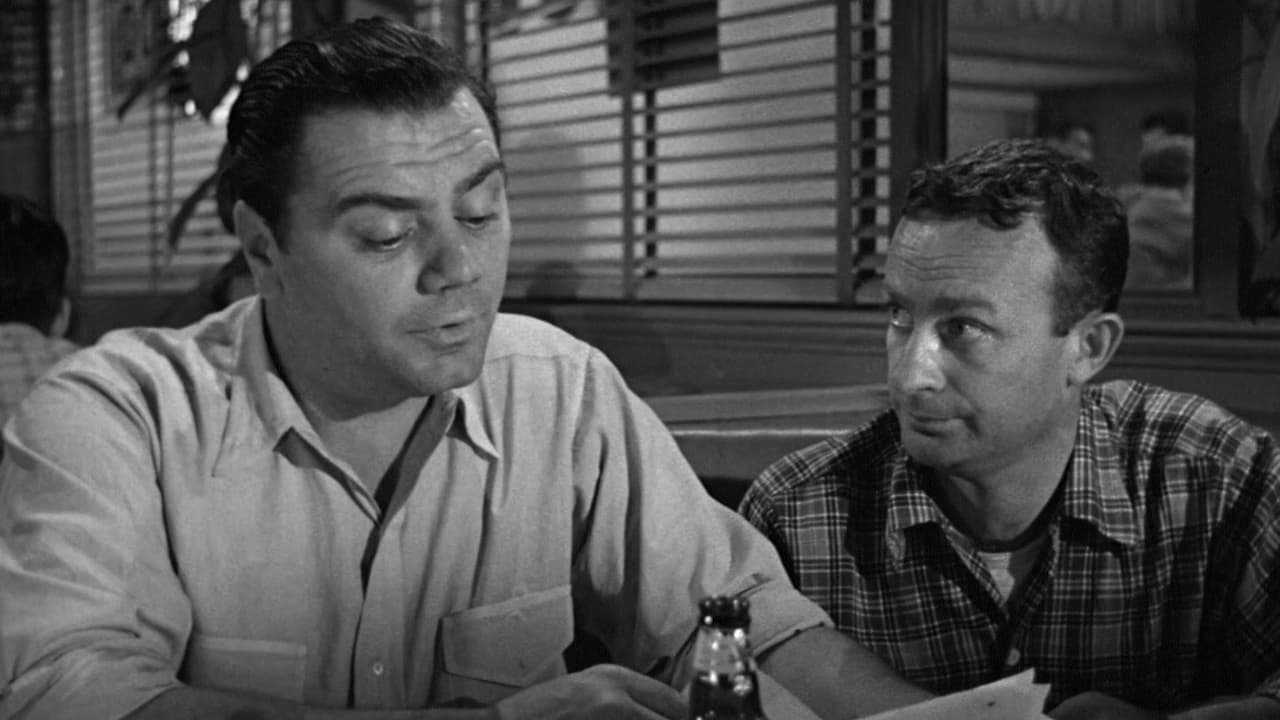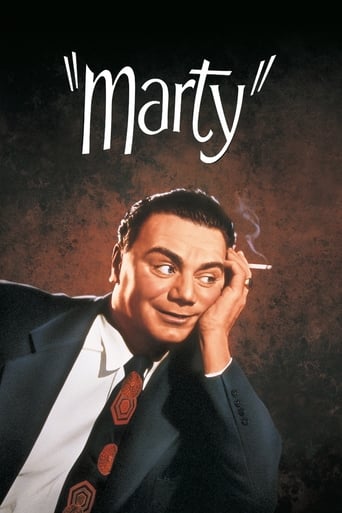TrueJoshNight
Truly Dreadful Film
Micah Lloyd
Excellent characters with emotional depth. My wife, daughter and granddaughter all enjoyed it...and me, too! Very good movie! You won't be disappointed.
Kimball
Exactly the movie you think it is, but not the movie you want it to be.
Phillipa
Strong acting helps the film overcome an uncertain premise and create characters that hold our attention absolutely.
calvinnme
In the opening scene you see a woman from a lower-class New York neighborhood chiding Marty Piletti continually: "Whatsa matter with you? Whatsa matter with you? Whatsa matter with you?" This is the theme of the movie – why isn't Marty married? Why isn't he loved? Why doesn't he fit in with the rest of society? Marty's social scene is his group of male friends who also can't get dates but are full of excuses about it, but he mainly hangs with his best friend Angie. Marty is filled with a lot of self-doubt, and is socially awkward. In one scene, Marty gets up the courage to call Mary Feeney after Angie convinces Marty that she likes him. He stumbles over his words: "I wonder if you might recall me?" Needless to say Mary does not recall him, nor does she want to go on a date with him.You can almost physically feel Marty's pain as he strikes out in life. The lines are good, and Borgnine delivers them so that they hit your heart. "There comes a point in a man's life when he's gotta face some facts. And one fact that I gotta face is that whatever it is that women like, I haven't got!" In contrast, you see married couples having their own sets of problems, Marty's cousins Virginia and Tommy in particular, showing that the grass on the other side is not always greener. They have a new baby and Tommy's mother is interfering. To be fair, Tommy pushed his mom towards selling the house she had lived in for a lifetime and moving in with the new couple.Marty finally sees light at the end of the tunnel when he meets Claire, a sweetly attractive girl who is dumped by her obnoxious blind date for not being "hot" enough. Two social rejects coming together and falling in love is seemingly a stale concept, but the script is fantastic. As they are dancing, Marty gives some insight into his character: "You don't get to be good-hearted by accident. You get kicked around long enough, you get to be a real professor of pain." Marty's mother, who was so anxious for Marty to get a girl, changes her mind when her sister moves from Tommy's couch to her couch, warning her that someday she'll be abandoned too. Angie doesn't like Marty's new girl because he is jealous of the way she monopolizes Marty's time. Marty is again filled with self-doubt and does not show up for his date with Clara, until he finally gets smart and realizes that he wants to rise above it all and pursue happiness.There was one thread running through the movie that I thought was interesting. The characters say one thing and feel one way early on, then change their minds later. Marty's mother encourages him to get married, then later tries to break up his new relationship with his girlfriend. Marty's cousin Tommy encourages Marty to buy the butcher shop, then later tells him he is foolish. Tommy is in agreement with his wife that his mother should live elsewhere, then turns on Virginia when his mother starts to cry. There are other such "switches" that happen throughout.Oh, keep an eye out and you might catch a glimpse of Jerry Ohrbach as a barely out his teens extra out on the dance floor.
saalehab
It really is a realistic simple love story. The characters are relateable and the story is heart warming to those who watch it. I would definitely recommend this to people who like more realistic love stories between to regular people who aren't deathly attractive or a handsome devil. I enjoyed this movie more than I thought I would, i had imagined I'd get a little bored but it kept me watching with really great acting by Borgnine and Blair who really had good chemistry. You found yourself rooting for Borgnine's character because you really felt for him, which I attribute to good acting. It was shot rally well, and directed well really expressing the characters feelings through their actions. A really nice movie
romanorum1
The movie occurs over one autumn weekend in New York City. Marty Piletti (Ernest Borgnine) is a good-hearted but socially artless thirty-four year old Bronx butcher. He lives with his widowed mother (Esther Minciotti). All of his siblings are married. Older women customers constantly badger the hapless man about marriage and settling down: "When are you gonna get married?" In truth the heavyset Marty, totally disheartened by his rejection by available women, has resigned himself to a permanent single life. He says, "Ma, sooner or later, there comes a point in a man's life when he's gotta face some facts. And one fact I gotta face is that, whatever it is that women like, I ain't got it."At the urging of his mother, on Saturday evening Marty heads to the Stardust Ballroom where younger people congregate, meet, and dance. Mrs. Piletti hopes he will meet a nice young Italian Catholic girl. Marty of course has difficulty in persuading ladies to dance with him. Before long, though, Marty approaches plain looking but decent twenty-nine year-old chemistry teacher Clara Snyder (Betsy Blair), who was abandoned by her rascal of a date. The two lonely people spend the evening enjoying each others' company – dancing, walking, and going to a luncheonette. Marty delivers one of the film's funnier lines, "See, dogs like us, we ain't such dogs as we think we are." Marty is so excited and so overjoyed that he talks a mile a minute: "There I go again. I can't stop talking'." He takes Clara home by bus and promises to call her the following day after Sunday Mass. Meanwhile there are several subplots that do not require reviewing here.On Sunday, Marty's friends and even his mother – who now fears being left alone after conversing with Aunt Catherine (Caterina = Augusta Ciolli) – disparage Clara. Feeling pressure from his mother and friends Marty does not call Clara after Mass. Then early that evening while Marty is with his friends he hears the same old refrain: "What do you feel like doing, Angie?" "I dunno. What do you feel like doing?" "I dunno."Arising from his slumber, Marty mimics the conversation, "'What are you doing tonight? I dunno. What are you doing tonight?' . . . Miserable and lonely and stupid! What am I, crazy or something? I got something good here. What am I hanging around with you guys for?" When his friends ask Marty what is wrong he finally reprimands them, "You don't like her. My mother don't like her. She's a dog. And I'm a fat, ugly man. Well, all I know is I had a good time last night. I'm gonna have a good time tonight. If we have enough good times together, I'm gonna get down on my knees. I'm gonna beg that girl to marry me. If we make a party on New Year's, I got a date for that party. You don't like her? That's too bad." He rushes to the nearest telephone booth to call Clara, who with her parents is watching the Ed Sullivan Show on TV. As he dials the telephone Marty tells his pesky friend (Joe Mantell), "Hey Angie, when are you gonna get married? You oughta be ashamed of yourself. You're thirty-three years old and your kid brothers are married. You oughta be ashamed of yourself." Marty closes the telephone booth door as Clara answers the phone. "Marty" exemplifies excellent performances by all. Nicely filmed on location in the Bronx, it was shot on a low budget ($343,000) that yielded high quality results and a hefty balance sheet ($3,000,000 in US revenues). This likable film won four Oscars, including Best Picture and also Best Actor for Ernest Borgnine. Overseas in Cannes it won the Golden Palm (Palme d'Or). In 1994, "Marty" was selected for permanent preservation in the National Film Registry.
cleigh115
Despite having only the most basic of story-lines, this is a nicely-crafted movie with a worthwhile story. The story goes beyond the surface of gloss and superficial beauty to the heart beating underneath. The film stars an admittedly unattractive person, and deals with his feelings of loneliness and insecurity. The story also shows that it is just one person you need, to peek at the good heart you carry. That's when the world goes upside down for Marty. We see Marty as he appears on the surface, then Mr. Borgnine peels away layer after layer, like an onion, revealing the real Marty deep inside. He calls himself "a fat, ugly man" but he has the most beautiful heart in the world. The supporting cast is first rate, especially Betsy Blair as the plain-jane Clara Snyder. The film explores so many issues, how people can ruin another person's happiness, how ideas and perceptions can change everything in a person's life. I cannot imagine this film being made today. Whenever they try to make films about "plain people" they end up trying to make Michelle Pfeiffer and Al Pacino look plain. It just doesn't work. This is a film of beauty, heart and soul.

